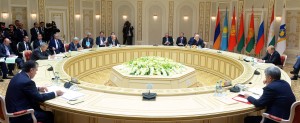MINSK – Illustrating the growing pull of the yet-to-be-launched Eurasian Economic Union, Armenia joined the group at a meeting of the leaders of Armenia, Belarus, Kazakhstan, Kyrgyzstan and Russia in the Belarussian capital on Oct. 10. Kyrgyzstan edged closer to joining by agreeing to a road map for its accession to the group’s predecessor, the Common Economic Space of Belarus, Kazakhstan and Russia.

Nursultan Nazarbayev (l), Vladimir Putin (c) and Alexander Lukashenko (r) moved the EEU closer to the official launch on Jan. 1, 2015, as they met in Minsk on Oct. 10.
On May 29, the presidents of Belarus, Kazakhstan and Russia met in Astana and signed a treaty establishing the Eurasian Economic Union (EEU). Now ratified by all three countries, the treaty is set to enter into force on Jan. 1, 2015.
Presidents Serzh Sargsyan of Armenia and Almazbek Atambayev of Kyrgyzstan joined their three colleagues at the Oct. 10 meeting in Minsk to participate in talks and sign respective documents.
Addressing the gathering, President Nursultan Nazarbayev of Kazakhstan stressed the need to enhance work on informing the business community and other citizens of the member states of the real and practical advantages of the EEU. He also highlighted the need to expand Kazakhstan’s representation among the personnel of the Eurasian Economic Commission, the permanent ruling body of the EEU. Nazarbayev also urged the commission to work harder on quickly and correctly translating documents into the national languages of the member states.
The next meeting of the highest level of the Eurasian Economic Commission is to take place in December in Moscow.
On the same day, Nazarbayev and presidents Alexander Lukashenko of Belarus, Almazbek Atambayev of Kyrgyzstan, Vladimir Putin of Russia and Emomali Rahmon of Tajikistan participated in the last meeting of the Eurasian Economic Community (EurAsEC) interstate council, signing a treaty terminating the EurAsEC. The EurAsEC, an intergovernmental organisation, had been created by those nations in 2000 to advance stronger economic connections. The EurAsEC and its institutions will end on Jan. 1, 2015.
The parties reached an agreement on the conservation of the EurAsEC anti-crisis fund and recognised the need for expedient further implementation of the intergovernmental programmes for reclaiming territories of EurAsEC member states affected by uranium mining industries and for innovative biotechnologies. This session was the final official event in the framework of the EurAsEC.
On the same day in Minsk, the heads of the Commonwealth of Independent States (CIS) signed a number ofdocuments aimed at further development of cooperation in humanitarian, security and other spheres within that group, which now contains fewer than a dozen of the former Soviet countries.
The agenda included 15 questionsand the leaders discussed theprospects for the development activities of the commonwealth, including the execution of the action plan for the implementation of the CIS development concept.
The leaders of the CIS states first met in a narrow format to discuss the key aspects of cooperation among the member states. The talks then continued in an extended format, followed by a signing ceremony of joint documents and a press conference.
Special attention was paid during the council meeting to cooperation in the humanitarian sphere, in particular to enhancing cooperation in education in the CIS. The participants declared2016 the Year of Education in the Commonwealth of Independent States and 2015 the Year of the Veteran.
A number of the documents relating to the cooperation of the law enforcement bodies of CIS member states were signed, including a programme of cooperation in combating illegal migration for 2015-2019, as well as the concept of cooperation in combating human trafficking.
In addition, the heads of state considered astatement on preserving and strengthening the international drug control system that expressed the willingness of CIS countries to increase international efforts to address drug problems based on strict compliance with international obligations.
 In addition, it was announced that Kazakhstan will chair the CIS Heads of State Council in 2015.
In addition, it was announced that Kazakhstan will chair the CIS Heads of State Council in 2015.
“We will continue to work on the development of trade and economic relations, free trade zones, cooperation in transit, agriculture and food security and the humanitarian area,” Nazarbayev said.
“The decision to pass the presidency to Kazakhstan from Belarus was unanimously supported by all the participants of the meeting,” Chairman of the CIS Executive Committee Sergei Lebedev said at the briefing after the summit. He also noted that Kazakhstan will host a series of major CIS events in 2015.
Documents on further interstate cooperation included the appeal of the CIS heads of state to the peoples of the commonwealth and the international community in connection with the 70th anniversary of the victory in the Great Patriotic War of 1941-1945. It was agreed to hold a joint celebration as proposed by Russian President Putin.
“The documents signed at the CIS summit lay a good foundation for further cooperation. Assuming the CIS chairmanship in 2015, Kazakhstan will prepare for the next council of the heads of state. It will take place in Astana. Kazakhstan considers the CIS a unique political platform that unites the post-Soviet countries. There is no other such organisation in our region. It is the best platform for solving arising issues, holding debates and exchanging opinions,” Nazarbayev said.
Nazarbayev also drew attention to the fact that all the heads of state were satisfied with the results of the summit and highlighted that the documents signed would help increase cooperation among the states.
In addition, President Nazarbayev held bilateral talks with Kyrgyz President Atambayev. The two sides discussed key issues of bilateral cooperation in trade, economic, investment, cultural and humanitarian spheres, as well as the implementation of previous agreements.
